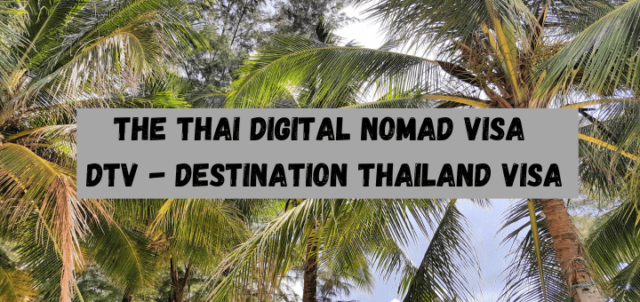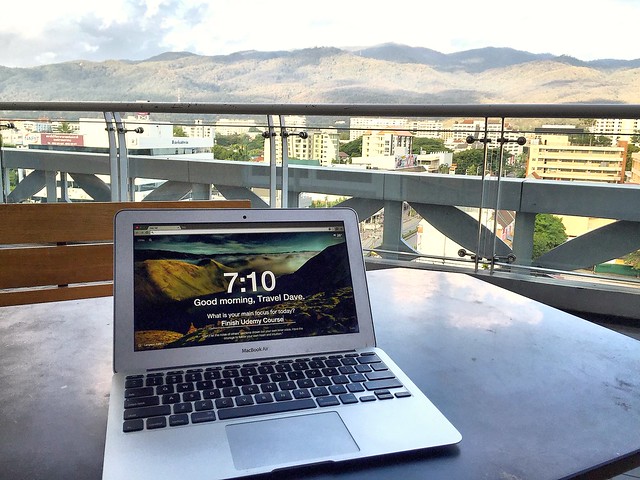Finally, Thailand has a Digital Nomad Visa for remote workers and freelancers.
The DTV – Destination Thailand Visa was launched in July 2024, and I successfully applied for one following an easy process.
In this blog post, I will explain all the steps I took to gain the DTV—Destination Thailand Visa.
I’ve seen many countries attempt to create visas for digital nomad remote workers, and so far, I haven’t been impressed.
Usually, they have been too good to be true or just a marketing gimmick to attract publicity.
Well done, Thailand! Finally, a remote worker digital visa that makes sense and is easy to apply for and obtain.
About the DTV – Destination Thailand Visa
Launched on July 15, 2024, the Thai government has confirmed that the Destination Thailand Visa (DTV Visa Thailand) is now live for UK passport holders. You can apply online via the Royal Thai embassy in London.
For those looking to work and travel (“workcation”) in Thailand, the DTV allows holders to stay for up to 180 days per entry and is valid for 5 years.
Referred to as the “digital nomad visa,” the DTV is an affordable and convenient way for a freelancer, digital nomad, or remote worker seeking a simple path to work from the tropical paradise of amazing Thailand.
Quick facts about the DTV visa:
Visa Duration: 5-years
Visa Type: Multiple entry
Length of Stay per Entry: 180 days
Extendable: Yes, once per year
At this point, it is essential to note that the DTV visa is a unique tourist visa in Thailand, meaning holders are prohibited from obtaining a Thai work permit and working for companies in Thailand.
Who is Eligible to apply for the Thailand DTV Visa?
The DTV – Destination Thailand Visa target audience comprises digital nomads, freelancers, and remote workers. This means that if you work remotely for a foreign company or work for yourself as a freelancer or influencer, this visa is designed for you.
I will also mention “Soft Power” activities later in this article, which is another way of applying for the DTV Visa.
5-year multiple-entry visa. You can stay in Thailand for up to 180 days per entry with a DTV. After reaching the 180-day limit, you must leave the country and re-enter to continue your stay. You can enter as many times as you like (multiple-entry) within the 5-year validity period.
It is also possible to extend your 180 days within Thailand for a fee at an immigration office (Extension information has yet to be confirmed regarding the costs).
How to apply for the DTV – Destination Thailand Visa
Let me explain the application process and the steps I took to obtain my 5-year DTV Destination Thailand Visa.
The total cost for a 5-year DTV—Destination Thailand Visa for UK passport holders was £300.
It’s well worth it for the freedom that I will be able to unlock.
There are no more Visa runs. I can now enter Thailand as a Digital nomad and work remotely from Chiang Mai, Phuket, Bangkok, or Koh Phangan.
This is the most crucial step. All applications are handled online on this website: Thai Visa.
First, you must create an account to access the website application portal.
Once you’ve created an account, you can apply for the DTV – Destination Thailand Visa.
When applying, you should mention that you wish to apply via the Royal Thai Embassy London.
Or, depending on where you are and where your passport is from, you can apply to your Thai embassy in the reverse direction.
For the sake of explaining, I will use the Royal Thai Embassy in London, as I am in London with a UK passport.
Requirements to obtain your DTV – Destination Thailand Visa.
First of all, you will have to apply before entering Thailand in your home country (or possibly another Thai Embassy, such as Tokyo).
Luckily, I will be flying to Thailand next week. This means I already have my flight tickets booked and in hand with all the flight information. You will need this information to apply for a DTV visa.
I also have a hotel night booked in Bangkok upon arrival, and I am currently in London, UK, for a couple of weeks to allow time to process the visa with the Royal Thai Embassy in London.
All important points:
– A flight to Thailand must be booked to activate the DTV.
– Must have a hotel room booked in Thailand.
– Must be outside of Thailand and consult with the Thai Embassy.
Luckily, the Royal Thai Embassy in London is happy to help with applications.
They are fully aware of the DTV – Destination Thailand Visa and are ready to help with new applications.
You do not need to visit the Royal Thai Embassy in London physically.
The beauty of the application is that all the documents, applications and visas are handled digitally.
Even the visa itself is issued as a digital PDF or E-visa.
You do not have to go to the embassy location. Just be within the country where you apply to activate the visa process.
Payment steps for the DTV – Destination Thailand Visa
The following payment steps are for obtaining your DTV – Destination Thailand Visa.
You will have to pay at the end of the final step of the DTV—Destination Thailand Visa application to finish your application online.
You can pay with a VISA or Mastercard (No American Express) for £300.
This £300 fee is non-refundable. You must pay to continue your application.
This is why you must ensure that you have all the correct documents to support your application. Otherwise, you might lose your £300 visa processing fee.
You are allowed to make requested adjustments. For example, if the documents you have submitted are not correct, you will be allowed to upload them again without having to pay again.
The fee is non-refundable, but corrections are allowed.
If your DTV – Destination Thailand Visa is denied, you will lose the £300.
So make sure you meet all the requirements before proceeding.
How long is the wait for applications to be approved.
My waiting time from application to approval was 24 hours. I was pretty much sorted out the day after making this application.
I’m thrilled with how swiftly my application was handled.
There was no need to wait for weeks or months. The Royal Thai Embassy London did a fantastic job of quickly turning things around.
I can’t speak about the length of time it takes to process visa applications at other Thai embassies as I have only applied at the London Embassy.
I want to take this opportunity to thank the Royal Thai Embassy in London for the quick turnaround on my visa application.
What will you need to apply for a DTV – Destination Thailand Visa?

(No need for these Thai issued blue background passport photos)
This is the crucial bit. Get this correct, and your application will be smooth.
Here are the supporting documents you will need to apply for your DTV – Destination Thailand Visa:
– PDF Passport copy. – Ensure you have a clear copy of your passport showing the biometric information. In my case, I had a UK passport. Once you upload your passport to the application, it will automatically fill out your passport information on the form, which I found relatively smart.
– A photo taken in the last six months. Find a white background and take a picture on your smartphone. Make sure you can see the top of your head clearly and down to your shoulders. The iPhone quality is good enough. There is no need for a passport photo booth; you can do it from your phone.
– A letterhead with your UK home address on it. This could be a utility bill or phone bill with your current address on it. Personally, I sent a picture of my driving licence with my home address on it, and this was perfectly fine and accepted.
Letterhead from HMRC—I sent a letter from HMRC with my name and address on it. This was a PDF from this year’s self-assessment tax return. You can blur out the confidential information if you wish. As long as your name and address are seen clearly on the letterhead, this is fine.
– Bank statements clearly stating that you have £11,000+ in your bank account. This is the most crucial part to get correct. You are not allowed to send screenshots of your current accounts. They must be PDF bank statements on bank-issued letterheads. Correct, this means you will have to wait for your bank to issue a current statement, download a digital version from your online banking or go into your bank to request a physical one.
– A Letter of application. This statement states why you want to apply for the DTV – Destination Thailand Visa. I made a letter using my company logo as a letterhead with my address, addressed to The Royal Thai Embassy London on it: (29-30 QQueen’sGate, South Kensington, London SW7 5JB). In the letter, I talked about why I wanted to remote work from Thailand and why I was applying for the visa.
This document was the most interesting one, as the Royal Thai Embassy London wants to hear from you directly about why you would like to apply for the visa.
I mostly mentioned that I am a freelancer working in the United Kingdom and that due to the cold winter months in London, I would like to remote work from Thailand (Valid point, right?). I also mentioned that I want to enjoy Thai food, go to the Thai gym, enjoy Thai massage, and basically spend time in Thailand supporting local Thai businesses, enjoying all the wonderful things Thailand has to offer.
Basically, I would like to remote work in Thailand as a Digital Nomad, running my freelance business, supporting local Thai businesses, and not taking work away from locals but instead spending it in Thailand. That’s the outcome of the visa and exactly why I wish to use it.
Alternative reasons for applying for the Destination Thailand Visa: Thai Soft Power activities

(You could apply for the DTV-Visa if you wish to go to Thailand to conduct in Thai cooking classes)
The DTV—Destination Thailand Visa is not only for Digital Nomads; you can apply for different reasons.
Alternatively, the reasons are Thai Soft Power activities.
These include:
– Thai kickboxing training
– Thai cooking classes,
– Undergo medical treatments, such as dentistry.
– Take short-term educational courses such as Thai language.
– Take part in seminars such as Thai security training.
– Thai artistic sessions or Thai Musical festivals.
I applied for the DTV – Destination Thailand Visa for Workcation purposes (Digital Nomads, Freelancers, Remote Workers).
The Soft Power activities offer alternative ways to apply for the same visa.
Technically, you could apply for the same visa if you wish to go to Thailand to conduct dentistry work, for example.
As I have applied for the visa myself for workcation purposes, I can’t offer any personal advice on applying via any of the “Soft Power” routes. Worth exploring if you qualify for any of these alternative reasons.
Disclaimer about applying for DTV – Destination Thailand Visa
I want to mention at this point that I am not a lawyer and cannot offer any legal advice. I would like to make clear that within this blog post, I only offer my opinion and experience on my own application process.
All information is subject to change by the Thai government without notice.
For the correct advice, you should always consult with your local Thai embassy. Thank you, and I appreciate your understanding.
The DTV – Destination Thailand Visa is relatively new, and changes can happen anytime.














